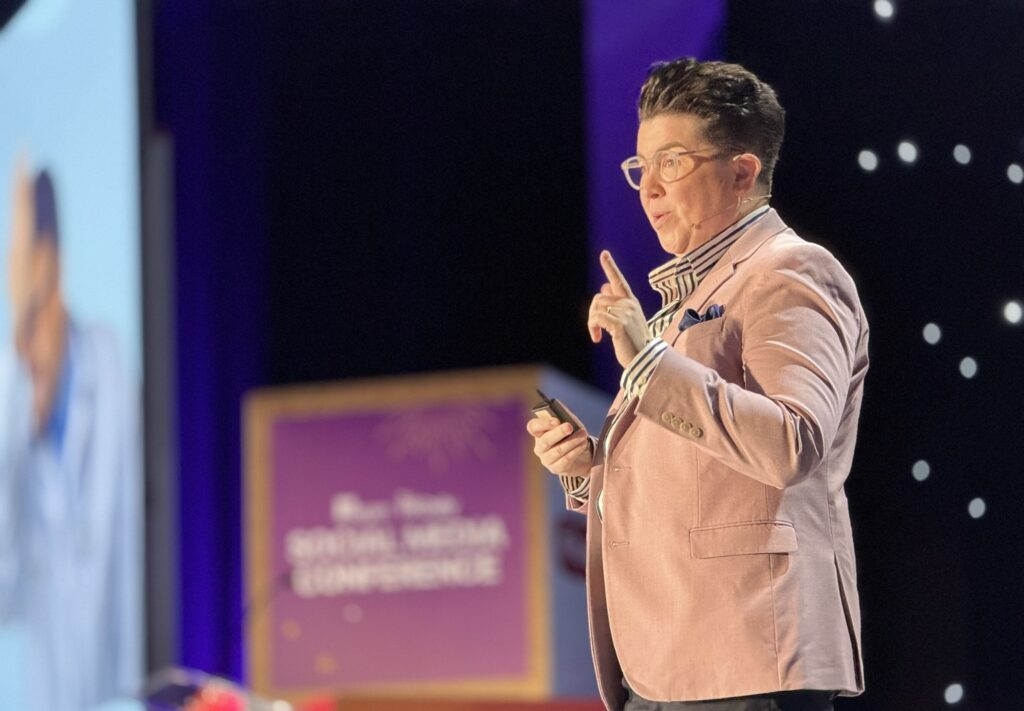How TikTok has redefined news, community and humanity
At Ragan’s Social Media Conference, TikTok reporter V Spehar expressed how organizations can show up on the platform — and why they should.

It’s no secret that traditional news outlets have largely failed to capture viewership and readership among Gen Z and younger millennial audiences. These generations favor short-form video platforms such as TikTok and Reels as not just news sources, but also entertainment platforms, search engines and community spaces. Indeed, nearly 30% of U.S. adults say they get some of their news from TikTok alone.
At Ragan and PR Daily’s 2024 Social Media Conference, held at Disney World’s Swan and Dolphin Resort, we heard from Vitus “V” Spehar, who has amassed more than 3 million followers on TikTok by reporting from under their desk — hence their handle, @UnderTheDeskNews.
Spehar has several missions: To improve the media literacy of their audiences and help them understand the value of traditional platforms, combat misinformation, and help organizations and non-users understand the platform’s value as a safe community space and an audience-building tool.
They’re certainly making progress. At first, Spehar was criticized for reporting on TikTok. But now, Spehar has spoken before UNESCO, reported from Capitol Hill, been invited to guest host the Los Angeles Times TikTok account, been interviewed on the Today Show and won a New York Commendation Award for their journalistic work on TikTok.
Read on to discover some of their best advice from the Ragan stage.
TikTok and legacy news
Not only is Spehar reporting from TikTok these days — but so are all of the other legacy publishers. And many have enjoyed great success and a boost in favorability, from the Washington Post’s humorous behind-the-scenes videos to the New York Times’ more traditional and sober approach.
Spehar’s channel outstrips nearly all of them in followers, though their approach also boosts traditional media: They often green-screen themself over a screenshot of a story from one of these outlets to explain its relevance to their audience, helping build trust in and explain the value of news.
“I call myself the Flava Flav of traditional media,” Spehar joked. “We can hype each other up, but it takes both of us. When we work together, we have a maximized experience.”
Discovery platform or national security threat?
Spehar also addressed the elephant in the room: TikTok is in the legislative firing line. American lawmakers are weighing a bill to ban the platform from app stores in order to force a divestment of TikTok’s U.S. business from ByteDance, citing issues such as data security concerns and misinformation.
Spehar acknowledged that misinformation and disinformation are a problem across any platform; TikTok reported that 19.4% of results for COVID-19 information contained misinformation — yet for traditional news, 78% of viewers also believe the information about the pandemic on broadcast news to be misinformation.
Given that predilection toward skepticism, Spehar advised the audience to continue to be appropriately skeptical when using the platform.
“You have to hold all the same sort of standards that we hold for ourselves in general when we hear somebody say something,” they said. “You have to figure that, of anything [on TikTok], at least 20% might not be true, and we need to double-check it.”
Meanwhile, in Florida, Governor Ron DeSantis passed a bill preventing children under 14 from using social media and requiring parental consent for users ages 14 to 15. Spehar framed this legislation as a violation of these users’ civil rights.
They also addressed the fact that social media is the best tool today to keep younger audiences civically engaged. For example, more than 35,000 new voters registered at Vote.org after Taylor Swift posted a link on her Instagram Story. Younger users are calling their senators to ask them not to ban the app after TikTok creators prompted them to do so and provided the correct contact information.
“Teenagers were blowing up their phone lines, and they lost that day because literally hundreds of thousands of people were calling them to say ‘don’t ban the app that I live on,’” Spehar said. “Don’t be on the app that has the connection to a community that I can’t find in my local neighborhoods.”
They said they stand against the ban — and encouraged the audience to do the same — because they get private messages from users who say that their only community and their only friends are on TikTok. “We want comprehensive data privacy protections, which we need,” Spehar said. “But we don’t want one single app, and people are gathering to be attacked in general because it never stops with one with the government.”
Tapping into the community
That sense of community was at the heart of their talk. “This is an organic place for assembly as much as it’s a place for free speech,” they said.
But it’s also a place where organizations can get results — and sales. “This is all awesome, easy, authentic organic content,” they told the audience. “You don’t have to super plan it out. You can be a little spontaneous and it can work for you.”
Spehar said now is the time to continue to invest in the platform. After all, more than 7 million U.S. businesses are on TikTok, and a sale from ByteDance would take time and additional legislation; they believe any ban that gets approved may take five years to put into effect due to litigation. “This is not something you need to abandon right now because this is not something that’s going to go away by September,” Spehar said.
They outlined disinformation tactics — fear, digital gaslighting, flooding, deepfakes and synthetic media, conspiracy clickbait, bullying and abuse — and encouraged organizations and individuals who use the platform not to engage in these tactics to boost engagement. Instead, they said to be true to their purpose, do good work and connect with the communities that await them there.
“There are bots, there are bad actors, there are contrarians.” Spehar said. “Push them out of your mind and focus on your core audience with the people that believe in you. Nothing else matters.”
With regard to AI, they advised creators and organizations to embrace their humanity. “I urge you to not lean too much on AI, but maintain that level of creativity and sense of self and understanding. You get it; you’re the best person to tell your message,” they said.
V Spehar’s talk was packed with information, so keep an eye out for those lessons on RaganTraining.com, and don’t miss more insights from speakers at our next show. And learn more in this Power Conversation between V and Jess Zafarris, content director at Ragan and PR Daily, that followed their keynote:
Jess Zafarris is the director of content at Ragan and PR Daily, and an author, editor and social media strategist.






